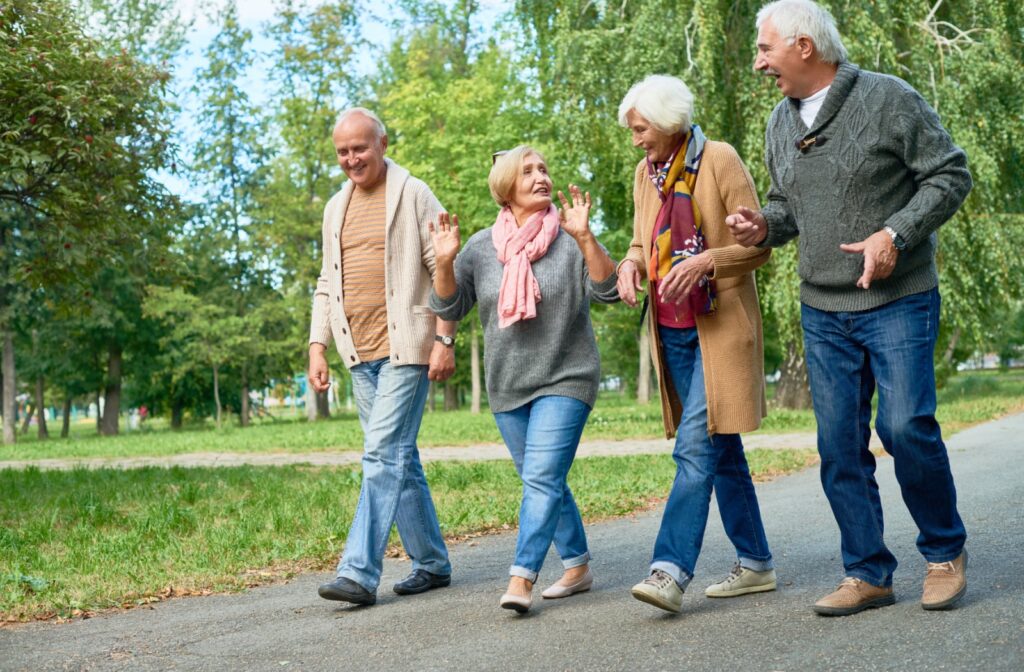If you’re looking for a simple yet powerful way to enhance your quality of life, consider joining a group walk. For seniors, group walks offer more than just a chance to stretch your legs—they provide numerous physical, mental, and social benefits.
Embarking on group walks with friends isn’t just a refreshing way to start the day; it’s a wonderful opportunity to foster meaningful connections with others in your community. It’s the joy of sharing stories, laughter, and companionship as you stroll through scenic paths together. Group walks can alleviate feelings of isolation and loneliness in seniors, promoting a sense of belonging and community.
Social Aspects of Group Walks
One of the most significant advantages of group walks is the opportunity to socialize. For many seniors, loneliness and isolation can be daunting challenges. Group walks offer a chance to connect with others, share experiences, and build relationships.
What’s more, being part of a group can foster a sense of belonging. Walking with others allows you to catch up with friends, or meet new friends who you can share stories with and create lasting memories. These social interactions can be incredibly valuable for emotional well-being and can help combat feelings of loneliness.
In addition to the emotional benefits, social interactions during group walks can also have tangible health benefits. Studies have shown that strong social connections can improve mental health, boost immune function, and increase longevity. By participating in group walks, you can support your overall health and well-being. Plus, it simply feels good to talk.
The Importance of Physical Activity for Seniors
Of course, one of the best parts of group walks is you’re getting up on your feet. Staying active is crucial for maintaining good health as we age. Regular physical activity can reduce the risk of chronic diseases, improve balance and coordination, and increase overall well-being.
Engaging in group walks offers an enjoyable way to stay active without the intensity of more strenuous exercises. Every little bit helps, and don’t let anyone tell you walking doesn’t count as exercise.
Group walks are especially beneficial because they combine physical activity with social time. Joining a regular walking group can help you stay motivated and make exercise a regular part of your routine. Maybe you want to go for a lap through the park after breakfast, or maybe your friends are more evening walkers and prefer to watch the sunset. Plus, the gentle nature of walking makes it accessible for most seniors, regardless of fitness level or mobility.
Choosing the Right Setting & Partners
Selecting the right environment for group walks is essential for ensuring an enjoyable experience. Look for locations that are safe, accessible, and scenic. Parks, nature trails, and community centers are great options that offer a pleasant setting for walking.
It’s also important to find walking partners who share similar interests and fitness levels. If someone wants an hour-long walk while you’d prefer a nice 20-minute stroll, you’ll have to work around that. Having compatible walking companions can make the experience more enjoyable and motivating. Consider joining a walking group or club specifically designed for seniors, where you can meet like-minded individuals and make new friends.
For those who prefer a more relaxed pace, consider finding a walking partner who enjoys leisurely strolls. This can help ensure that the walk remains enjoyable and doesn’t become too strenuous. Remember, the goal is to stay active and have fun, so choose a setting and partners that align with your preferences.
Overcoming Challenges
While group walks offer many benefits, some seniors may face challenges that make participation difficult. Common concerns include mobility issues, fear of falling, and health conditions. However, there are practical solutions to address these challenges.
For seniors with mobility issues, consider using walking aids such as canes or walkers to provide additional support. Choosing flat, even surfaces for walks can also reduce the risk of falls and make walking more comfortable. If health conditions are a concern, consult with a healthcare professional to determine the best approach to staying active.
Another challenge may be finding the motivation to participate in group walks. Setting small, achievable goals and celebrating progress can help maintain motivation. You don’t have to break any records tomorrow, simply enjoy the scenery and company. Additionally, having a regular walking schedule and committed walking partners can provide the encouragement needed to stay consistent.
Putting One Foot in Front of the Other
Group walks offer a pleasant combination of physical, mental, and social benefits for seniors. By staying active, connecting with others, and simply enjoying the outdoors, you can enhance your overall well-being. If you haven’t already, consider incorporating group walks into your routine or encouraging your loved ones to do so.
At The Villages at the River Club, we value the importance of community and social interaction. We invite you to book a tour and take a stroll across our lush grounds. Who knows? You might find your next walking partner!



